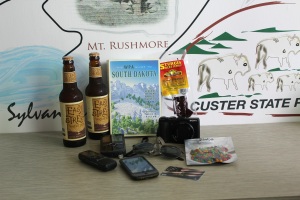Rapid City Report: What Does ‘Green’ Mean?
by Deborah Fallows
At the Adoba Hotel, the carpet is composed of individual tiles, which show up as tan and dark brown in the photo above; the tiles are made from recycled natural grass, stone, and fibers from other carpets. The carpet backing is made from sugar, salt, sand, and rubber. If carpet tiles get soiled or stained, they can be replaced one by one. When the carpet wears out, the Meralis can sell the tiles to a recycler, who will remake them into new carpet tiles and maybe even sell them back to the Meralis. (Read it here.)
Category Archives: Rapid City SD
The ‘Rapid’ Story: Trains, Planes, and the Making of a City
The ‘Rapid’ Story: Trains, Planes, and the Making of a City One of the things that makes it worthwhile to visit small American cities away from the busy urban centers of the coasts is that in many cases the history of the place still stirs the imagination: questions about settlement have not been rendered all-but-invisible by development. So one wonders, How was this place settled? Who came here? Why? How? (Read it here.)
One of the things that makes it worthwhile to visit small American cities away from the busy urban centers of the coasts is that in many cases the history of the place still stirs the imagination: questions about settlement have not been rendered all-but-invisible by development. So one wonders, How was this place settled? Who came here? Why? How? (Read it here.)
On the ‘Orientalism’ of the Prairie
On the ‘Orientalism’ of the Prairie
by James Fallows
What happens when the “ordinary objects of our culture” are treated as curiosities? (Read it here.)
Life on the Road: Beef Jerky, Swimming, and a Search for Spiritual Relief
Life on the Road: Beef Jerky, Swimming, and a Search for Spiritual Relief
by Deborah Fallows
Today, we are on an unplanned layover in Rapid, which until a few days ago we called Rapid City, probably like you still do. Just now, in our independently-owned eco hotel, a Chinese student from Shandong province, in the rough and raw northeast of mainland China, came to our room delivering a small bag of colorful candies as a welcome to Mount Rushmore country. She was as surprised at my Chinese babble as I was at seeing her face here in southwest South Dakota. (Read it here.)